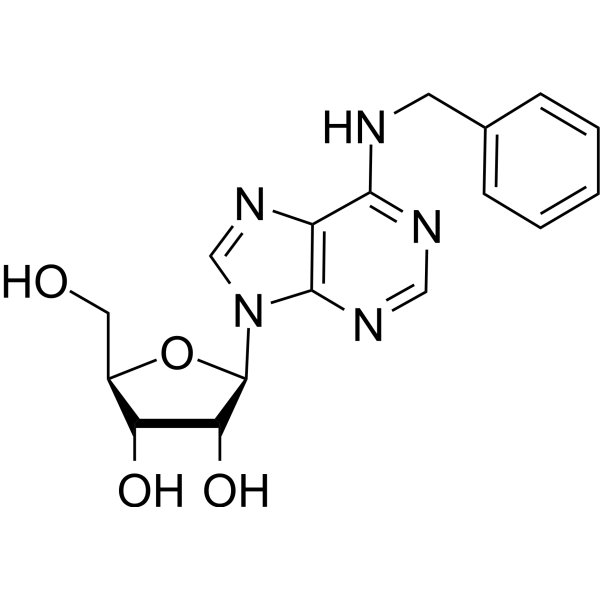N6-Benzyladenosine (Synonyms: Benzyladenosine) |
| Catalog No.GC67272 |
La N6-Benzyladenosine est un agoniste des récepteurs de l'adénosine, a une activité cytoactive. La N6-benzyladenosine arrête le cycle cellulaire en phase G0/G1 et induit l'apoptose cellulaire. La N6-benzyladenosine exerce également un effet inhibiteur sur l'adénosine kinase et le gliome de T. gondii.
Products are for research use only. Not for human use. We do not sell to patients.

Cas No.: 4294-16-0
Sample solution is provided at 25 µL, 10mM.
N6-Benzyladenosine is an adenosine receptor agonist, has a cytoactive activity. N6-Benzyladenosine arrests cell cycle at G0/G1 phase and induces cell apoptosis. N6-Benzyladenosine also exerts inhibitory effect on T. gondii adenosine kinase and glioma[1]-[5].
N6-benzyladenosine suppresses the clonogenic activity and the growth of different neoplastic cells[2].
N6-benzyladenosine results cell morphology alteration and actin cytoskeleton disorganization in T24 cell[2].
N6-benzyladenosine (10 μM; 24 h) is a potent inductor of apoptosis, and belongs to apoptotic systems with distinct caspase-3 and caspase-9 activation[3].
N6-benzyladenosine (0-100 μM; 24 h) induces chromatin condensation, formation of apoptotic bodies, and cleavage of DNA to nucleosomal fragments in a dose-dependent manner[3].
N6-benzyladenosine acts as a selective anti-toxoplasma agent with binding affinity to T. gondii adenosine kinase (apparent Km =179.8 μM), over human adenosine kinase[4].
N6-benzyladenosine (0-50 μM) shows weak inhibition against adenosine kinase deficient (TgAKS3) strains of Toxoplasma gondii[4].
N6-benzyladenosine (compound 2) (0.3-20 μM) exerts anti-glioma activity by interfering with the mevalonate pathway and inhibiting FPPS (Farnesyl pyrophosphate synthase) [5].
Apoptosis Analysis[3]
| Cell Line: | HL-60 |
| Concentration: | 10 μM |
| Incubation Time: | 24 hours |
| Result: | Induced cell apoptosis by increasing caspase-3 (DEVDase) as well as caspase-9 (LEHDase) activity, indicating an apoptotic systems with distinct caspase-3/9 activation. |
Apoptosis Analysis[5]
| Cell Line: | U87MG human glioma cell line. |
| Concentration: | 0.3, 0.6, 1.2, 2.5, 5, 10, 20 μM |
| Incubation Time: | 48 hours |
| Result: | Inhibited glioma growth by interfering with the mevalonate pathway and inhibiting FPPS. |
[1]. Kaminek M, et al. Cytokinin activities of N6-benzyladenosine derivatives hydroxylated on the side-chain phenyl ring. Journal of Plant Growth Regulation. 1987. 6(2):113.
[2]. Castiglioni S, et al. N6-isopentenyladenosine and its analogue N6-benzyladenosine induce cell cycle arrest and apoptosis in bladder carcinoma T24 cells. Anticancer Agents Med Chem. 2013 May;13(4):672-8.
[3]. Mlejnek P. Caspase inhibition and N6-benzyladenosine-induced apoptosis in HL-60 cells. J Cell Biochem. 2001;83(4):678-89.
[4]. Kim YA, et al. Synthesis, biological evaluation and molecular modeling studies of N6-benzyladenosine analogues as potential anti-toxoplasma agents. Biochem Pharmacol. 2007 May 15;73(10):1558-72.
[5]. Grimaldi M, et al. NMR for screening and a biochemical assay: Identification of new FPPS inhibitors exerting anticancer activity. Bioorg Chem. 2020 May;98:103449.
Average Rating: 5 (Based on Reviews and 30 reference(s) in Google Scholar.)
GLPBIO products are for RESEARCH USE ONLY. Please make sure your review or question is research based.
Required fields are marked with *




















